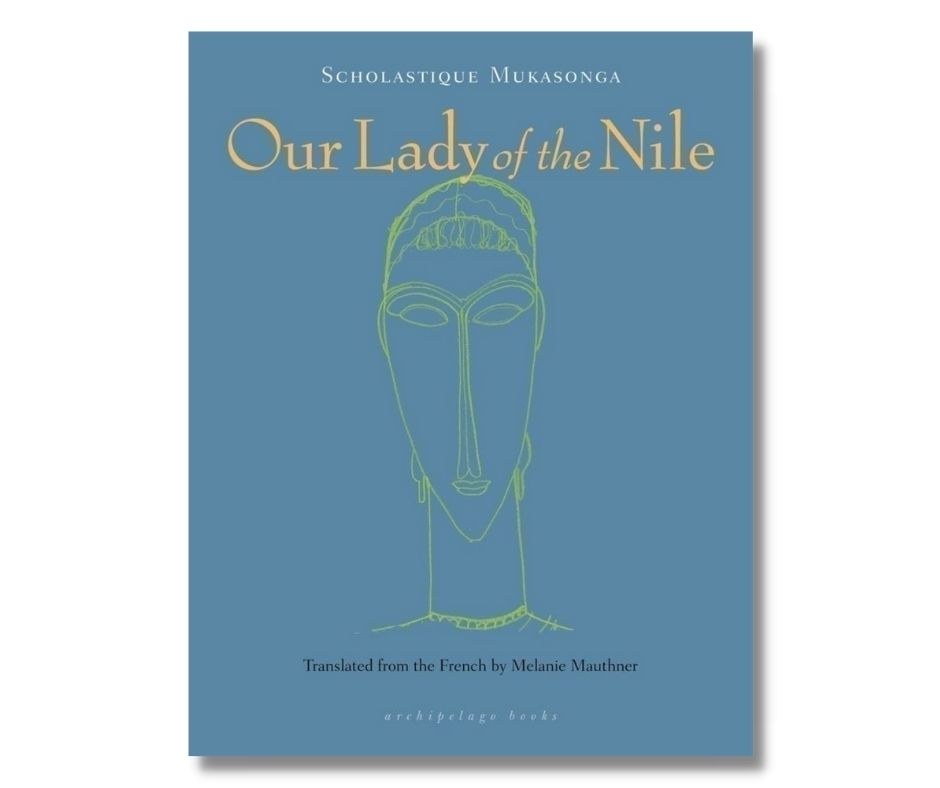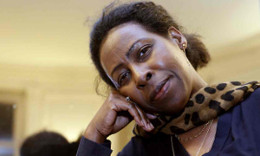Our Lady of the Nile
Translated from French by Melanie Mauthner
Publisher: Archipelago (September 16, 2014)
Purchase ‘Our Lady of the Nil’ on Amazon|Barnes & Noble.|Archipelago
Shortlisted for the 2015 FT/Oppenheimer Funds Emerging Voices Award
Named a Best Book of 2014 by Publisher’s Weekly
In her first novel, Our Lady of the Nile, originally published in 2012 by Gallimard, Scholastique Mukasonga drops us into an elite Catholic boarding school for young women perched on the ridge of the Nile. Parents send their daughters to Our Lady of the Nile to be molded into respectable citizens . . . and to escape the dangers of the outside world. Fifteen years prior to the 1994 Rwandan genocide, we watch as these girls try on their parents’ preconceptions and attitudes, transforming the lycée into a microcosm of the country’s mounting racial tensions and violence. In the midst of the interminable rainy season, everything unfolds behind the closed doors of the school: friendship, curiosity, fear, deceit, prejudice, and persecution. With a masterful prose that is at once subtle and penetrating, Mukasonga captures a society hurtling toward horror.
Review
A Publishers Weekly Book of the Year for 2014
“In part, this is a good-humored yearbook of the adventures and scandals among the all-girl school’s precocious teenage charges, where the greatest peril to morality is the arrival of a male teacher with long blond hair. But soon the school, abetted by its hypocritical administrators (including those Belgian civilizers), becomes a petri dish for Hutu militancy, and normal adolescent pranks take on horrifying consequences. The novel’s abrupt transition from a naïve coming-of-age story to a violent tragedy is jarring—though surely it doesn’t even begin to convey the shock of the reality.” – The Wall Street Journal
“[Mukasonga’s] deliciously limpid, melodious style makes Rwandan daily life vividly accessible … Mukasonga expertly draws together all her threads and stories in climactic sequences to create a skillfully-orchestrated vision, both loving and fearful, of her beloved homeland ripped apart by vicious racial hatred.” – Shelf Awareness
“We should […] welcome the opportunity to read Mukasonga’s work in English. African francophone literature, and particularly that written by women, continues to be underrepresented in English, and as a result, we are not only missing out on compelling stories, but on an important political project. Scholastique Mukasonga, and likely many of her colleagues whom we have yet to translate, is working to correct the frustratingly persistent Western narratives about Africa and its history. […] The West has indeed too often dismissed suffering in Africa, but books like Our Lady of the Nile remind us why we must not be dismissive, why we must not look away.” – Madeleine LaRue, Music & Literature
“Our Lady of the Nile swept me up with its artful bitterness […] [Our Lady of the Nile] is buoyed by its air of foreboding consequence that imparts urgency to almost every page.” – Barnes & Noble Review
“Sneaky, lingering, her story evokes a sense of menace, and eventually a scene of full-blown violence, that sticks with you […] Our Lady of the Nile, published in English twenty years after the massacre of the Tutsi people, is a political novel, addressing race, culture, gender. The brutality of the Hutu-Tutsi conflict is easily misunderstood. This book makes it human, brings it down to the level of the everyday. When the question of how such a thing could have happened is asked, the treacherous answer is here, in the mundane. By imagining the everyday lives of Rwandans, Mukasonga makes more sense of the climate leading up to the genocide than a stack of news articles does. From this slant, the novel does its work quietly and well, with its head down—the way a Tutsi student might have done at Our Lady of the Nile.” – Bibi Deitz, Bookforum
“The novel reflects glimpses of a tension-filled past and slowly moves to uncover racial strife and the increase of genocidal actions against the Tutsi minority in Rwanda through the eyes of lycée girls enrolled at a Catholic boarding school that stands isolated on the Ikibira mountaintop by the river Nile, gated and guarded.” — World Literature Today
“In a writing style both rough and tender, Our Lady of the Nile depicts a society inevitably heading towards horror. […] Poignant and tenacious.” – Christine Rousseau, Le Monde
“Whoever has loved Africa will be touched by this story […] It is the very essence of Africa, an immense Africa that will absorb even this terrible genocide.” – Joël Prieur, Minute
“Strangely, it is in this incredibly light novel, that one best understands the ethnic, political, and religious reasons behind the massacre of the mysterious Tutsis.” – Arnaud Viviant, Regards
“[After she was awarded the Prix Renaudot] I went out and procured every work by Scholastique Mukasonga. […] Never has a prize been more merited.” – Frédéric Beigbeder, Lire
“In this well-constructed novel, the grim final scenes prefigure the horrors to come.” – The Arts Fuse
“A quite powerful novel of Rwanda, Our Lady of the Nile gives a good sense of life and conditions there in the early 1970s — and the longstanding ethnic strife that took such a human toll, both before and after the period described here.” – complete-review.com



No Comment